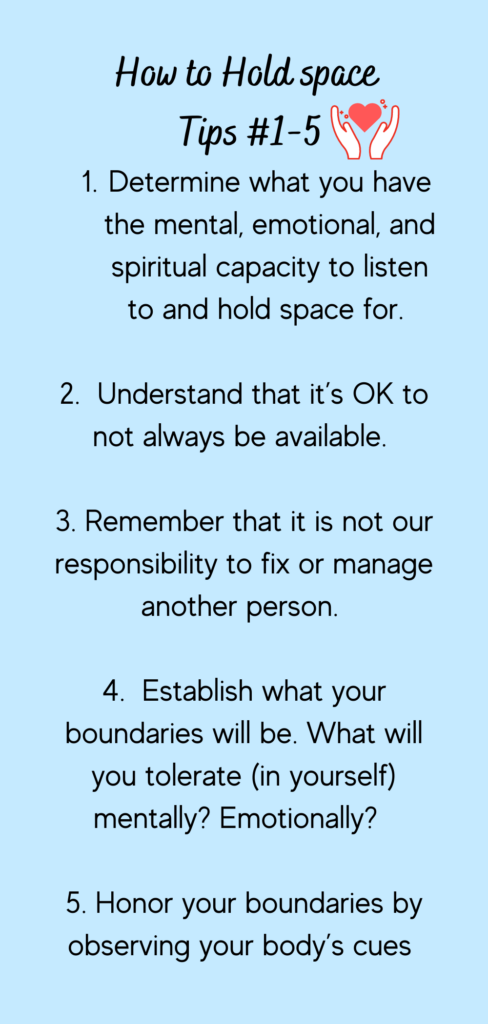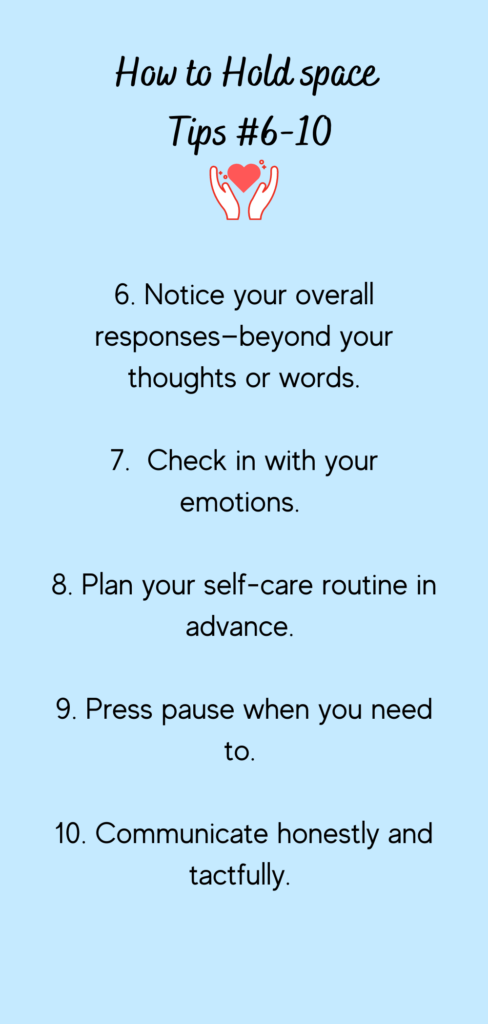It took some time, but I finally learned to lovingly release people and allow them to live their own lives. I chose holding space, instead of trying to fix them.
Char Aukland
As someone who loves helping others and giving advice, this was one of the hardest things I had to learn. My most powerful lessons came from my experiences while working on an inpatient psychiatric unit.
Two years of “helping” pushed me to the point of burnout. No matter how hard I tried to come up with solutions for my patients, very few things seemed to work.
Finally, I had enough. Thankfully, it was at a time when we were moving to a different duty station.
Ultimately, I learned — we can’t:
- want something for someone more than they want it for themselves
- prescribe and control someone else’s behavior
- disable what is driving them
- make someone care
- fix anyone—ever
- take action for someone else
I also realized that I had my own problems to solve— like dealing with my codependent tendencies.
The Trap of Codependency
Simply put, we are behaving codependently when we are willing to sacrifice our own needs, in an effort to show up for someone else. Though being codependent is anything but simple.
Needs like self-care, emotional stability, inner peace, and even our physical needs may suffer—all while we try to take care of another person’s life.
Though I left my job on the psych ward, I still lived my life trying to fix people.
Friendly Advice
Instead of being a true friend, I was functioning as a pseudotherapist. People would come to me with their problems and I would give them solutions—only to find myself frustrated and slightly bitter when they didn’t follow my advice.
For me codependency looked like trying to:
- Fix people
- Save others from their choices
- Control someone else’s decisions
- Share my wisdom (eyeroll)
- Manage lives outside my own
- Show up for others as a personal savior
Over time, I found that the same feelings of burnout were coming back. But, in looking at the list above, it’s no wonder I was struggling.
The difference was that this time there was no escape. I had to deal with the life I had created for myself.
Although codependent traits are quite common, each of us will have behaviors that are different from other codependents. The key is self-awareness.
Become familiar with codependency and what it looks like for you.
Boundaries
Boundaries became my saving grace. I put them in place to stop myself from getting involved in things that were beyond my ability to control— like other people’s choices.
Char Aukland
People still came to me for advice, but one boundary that I enacted for myself was not to give it —although I did listen to and hold space for them.
For those who struggle with codependency, boundaries for ourselves should be a priority. Establishing them lets us know in advance what we will and will not tolerate from ourselves.
Boundaries also help us define how we want to interact with others.
Holding Space
Holding space for another person takes patience, emotional maturity, an understanding of our own needs, and practice.
This is especially true when coming from a background of being a fixer/helper.
Learning how to hold space, without becoming overly involved or judgmental, is key. If we don’t observe those “rules”, we risk venturing into areas that will only add to our own burdens…rather than helping another person carry theirs.

Tips for Holding Space
- Determine what you have the mental, emotional, and spiritual capacity to listen to and hold space for. I cannot emphasize this enough. When we’re not careful, we can end up taking on something that can pose a danger to our own wellbeing.
- Understand that it’s OK to not always be available.
- Remember that it is not our responsibility to fix or manage another person. While holding space, make sure to monitor your own behavior for codependency.
- Establish what your boundaries will be. What will you tolerate (in yourself) mentally? Emotionally? This is an important consideration. Knowing our limits helps prevent us from going further than we can handle.
- Honor your boundaries by observing your body’s cues for signs of becoming anxious, overwhelmed, or stressed.
- Notice your overall responses—beyond your thoughts or words. Are you sighing, clenching your jaws, or fatigued?
- Check in with your emotions. Are you feeling irritable or angry, experiencing a depressed mood? If so, it may be time to take a step back.
- Taking care of ourselves is essential. Plan your self-care routine in advance.
- Press pause when you need to. Though the “helper” in us may want to keep giving, sometimes, we simply have to rest. Mental, emotional, and spiritual breaks are allowed and necessary—even in friendships. We are no good to others when we are in our own state of collapse.
- Communicate honestly and tactfully. When we are afraid of confrontation, making things worse, or hurting someone’s feelings, we don’t always speak truthfully. If you are having difficulty holding space or don’t have the emotional capacity to do so…say something.

As long as we have the capacity, holding space is a beautiful and powerful thing do for someone.
I’ve had it done for me and I’ve done it for others. It works.
Having the mental/emotional/spiritual/physical energy to do it properly is the key.


